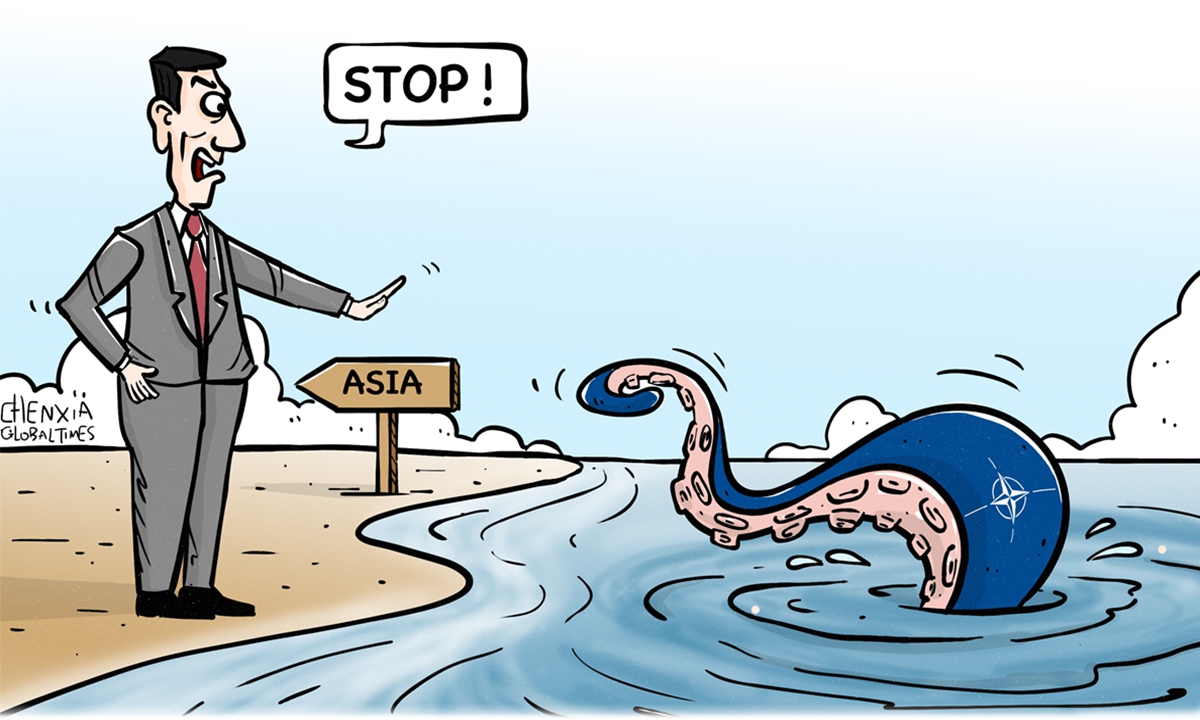
Illustration: Chen Xia/Global Times
NATO is reportedly planning to open a liaison office in Tokyo, the first of its kind in Asia, which Chinese analysts believe is a dangerous sign that the violent multilateral organization will take its first aggressive step in the Asia-Pacific, actively pushed by Japan.
In response to the reported plan, Mao Ning, spokesperson of the Chinese Foreign Ministry, told media on Thursday that Asia is an anchor for peace and stability and a promising land for cooperation and development, not a wrestling ground for geopolitical competition.
NATO's continued eastward foray into the Asia-Pacific and interference in regional affairs will inevitably undermine regional peace and stability and stoke camp confrontation. This calls for high vigilance among regional countries, Mao warned.
Through the potential move, a prototype of a military alliance consisting of the US, some European countries and Japan could be further formed, which will obviously target China, Chinese analysts warned, noting that Japan joining NATO cannot be ruled out in the future.
Japanese media outlet Nikkei Shimbun revealed the plan between NATO and Japan. The office, which could be opened next year, will allow NATO to conduct periodic consultations with Japan and key partners in the region such as South Korea, Australia and New Zealand "as China emerges as a new challenge, alongside its traditional focus on Russia," Nikkei reported.
The plan was confirmed by both Japanese and NATO officials, Nikkei reported.
If Tokyo provides the funding for the Western military alliance to gain a foothold in Japan, it would symbolize a new phase in defense cooperation, Nikkei noted.
Although Nikkei said that NATO-Japan cooperation, going forward, will focus on challenges that transcend regions, such as cyber threats, disruptive technology and disinformation activities, Chinese analysts predicted that the Tokyo office is certain to develop into a frontline against China through strengthening military and security cooperation.
Liu Jiangyong, vice dean of the Institute of Modern International Relations at Tsinghua University, believes that the liaison office will cover not only East Asia, but also regions ranging from Northeast Asia to the Indian Ocean and further to the South Pacific, so as to form an arc of military deterrence encircling China. Specifically, the NATO-Japan collusion aims to deter China on the Taiwan question, the Diaoyu Islands and the South China Sea issues, Liu told the Global Times on Thursday.
Japan has actively pushed for NATO's eastward advance, Liu pointed out. Japan is currently taking advantage of the so-called dramatic change in the security situation to push for a constitutional amendment with ruthless ambition. If the constitutional amendment is made, it is conceivable that Japan could formally join NATO, through which the US, some European countries and Japan will be ready to form a global military alliance against China, Liu said.
But considering some NATO state members, including France, continue to have constructive ties with China, seeing China as a so-called systemic challenge is only a strategy of individual countries, Liu said. He urged China to be vigilant over Japan constantly sending negative information about the "China threat" to NATO in order to induce the military alliance to intervene in East Asian affairs and the Taiwan question.




